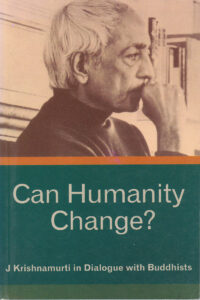Can Humanity Change? – J. Krishnamurti in Dialogue with Buddhists
Door Jiddu Krishnamurti (1895 - 1986).
224 Pages | Published in 2005 | Softcover | Krishnamurti Foundation, India | ISBN: 8187326573.
Many have considered Buddhism to be the religion closest in sprit to J.Krishnamurti’s spiritual teaching-- even though the great teacher was famous for urging students to seek truth outside organized religion. This record of an historic encounter between Krishnamurti and a group of Buddhist scholars provides a unique opportunity to see what the great teacher had to say himself about Buddhist teachings. The conversations, which took place at Brockwood Park in England in the late 1970s, focus on human consciousness and its potential for transformation. Participants include Walpola Rahula, the renowned Sri Lankan Buddhist monk and scholar, author of the classic introductory text What the Buddha Taught.
From Chapter - 'Are You Not Saying What The Buddha Said'? (p. 7):
" Walhula Rahula: Scriptures and all our knowledge condition human beings, there is no doubt about that. But I should say that knowledge is not absolutely unnecessary. Buddha has pointed out very clearly that if you want to cross the river and there is no bridge, you build a boat and cross with its help. But if, on the other shore, you think, Oh this boat has been very useful, very helpful to me, I can't leave it here, I will carry it on shoulders, that is a wrong action. What you should say is: Of course this boat was very helpful to me, but I have crossed the river, it is no more use to me, so I'll leave it here for somebody else. That is the attitude toward knowledge and learning. Buddha says that even the teachings, not only that, even the virtues, the so-called moral virtues, are also like the boat and have a relative and conditioned value. "
The conversations, which took place at Brockwood Park in England in the late 1970’s focus on human consciousness and its potential for transformation. Participants include Walpola Rahula, the renowned Sri Lankan Buddhist monk and scholar, author of the classic introductory text "What the Buddha Taught".
 Bezig met bijwerken...
Bezig met bijwerken...